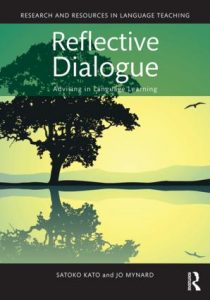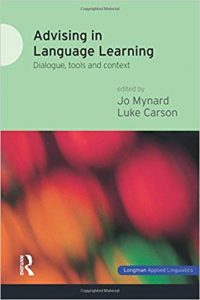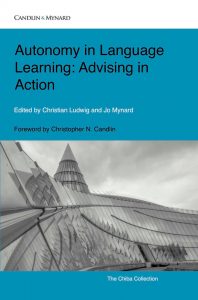Equipment and skills needed
Students must have regular access to a computer and the Internet, and be able to use computer skills to complete the course successfully. It is preferred to have hardware such as a webcam, headset, and microphone. Materials can be viewed on any device.
Course textbook (required):
 Reflective Dialogue: Advising in Language Learning
Reflective Dialogue: Advising in Language Learning
Authors: Kato, S. & Mynard, J.
Publisher: Routledge NY;
Published: 2016
ISBN: 978-1138825925
Other useful (but optional) textbooks:
 Advising in Language learning: Dialogue, tools and context.
Advising in Language learning: Dialogue, tools and context.
Editors: Mynard, J., & Carson, L.
Publisher: Pearson Education
Published: 2012
ISBN:978-1408276952
 Benson, P. (2011). Teaching and researching autonomy (2nd ed.). Harlow, UK: Longman Pearson
Benson, P. (2011). Teaching and researching autonomy (2nd ed.). Harlow, UK: Longman Pearson

Ludwig, C., & Mynard, J. (Eds) (2019). Autonomy in language learning: Advising in action. Hong Kong: Candlin & Mynard. (https://www.candlinandmynard.com/chiba.html)
Assessment
Grades: Pass/fail
Participants are expected to complete all of the assigned work and participate fully* on all activities to be eligible to receive the completion certificate.
*Full participation includes;
- Attending all the live lectures. Recordings will be available if absence is unavoidable (this must be agreed with the instructors in advance)
- Actively engaging in class activities and discussions during the live lectures
- Active participation in the online forums
- Completion of weekly tasks
- Timely submission of final assignment
- Sufficient time spent on reading and viewing recorded lectures
Assessments
Final paper
- Conduct and record an advising session (around 30 minutes) with a student by using the advising strategies you have learned in this course. It is better to focus on 2 to 3 strategies when conducting a session (e.g. summarizing, asking powerful questions, using metaphors). You may also use one of the advising tools if you like.
- Listen to the recording and analyze the session. Notice a key moment in the session.
- Write a reflective paper drawing on extracts from the data to answer the following questions:
- What specific aspects of your advising did you focus on? Why?
- What are your thoughts on the focus areas?
- How satisfied do you feel with the session? Is there anything that you would have done differently?
- What did you learn from the entire process and how can you apply it to your own settings?
Publication opportunity
Your final paper will be considered for publication in Relay Journal as part of the Reflective Practice column. We recommend you read previously published papers in that column as examples of advising session reflections.
Due: February and September
Maximum length: 1500 words
